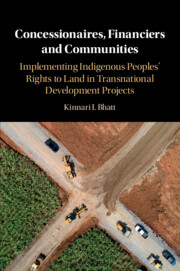 Concessionaires, Financiers and Communities
Concessionaires, Financiers and Communities Coping Strategies, Lacunas and Fragmentation in the Formal Legal Framework
Published online by Cambridge University Press: 02 March 2020
Having defined the field, Chapter 3 critically analyses the surrounding contemporary formal legal framework for indigenous peoples’ land rights that speak to development projects. This chapter examines jurisprudential strands and structural gaps such as poor accountability of private actors and the fragmented due diligence in this field. Emerging from this analysis are identifiable themes that matter for rights in development project contexts. The point is to assess the existing coping strategies of formal law in this setting, to give hard law context to the private mechanisms explored and to appreciate judicial and non-judicial mechanisms as part of an ecosystem of remedies in this field. The chapter asks why, despite the array of indigenous rights cases and legal declarations, international and domestic norms rarely pierce the highly regulated veil of private mechanisms that secure a transnational development project – failing to work as a legal threat. Whilst later chapters illustrate other reasons such as power and short-term behaviour that contribute to law’s overshadowing, my aim here is to show how the law endogenously contributes to insecurity for indigenous communities in development contexts.
To save this book to your Kindle, first ensure [email protected] is added to your Approved Personal Document E-mail List under your Personal Document Settings on the Manage Your Content and Devices page of your Amazon account. Then enter the ‘name’ part of your Kindle email address below. Find out more about saving to your Kindle.
Note you can select to save to either the @free.kindle.com or @kindle.com variations. ‘@free.kindle.com’ emails are free but can only be saved to your device when it is connected to wi-fi. ‘@kindle.com’ emails can be delivered even when you are not connected to wi-fi, but note that service fees apply.
Find out more about the Kindle Personal Document Service.
To save content items to your account, please confirm that you agree to abide by our usage policies. If this is the first time you use this feature, you will be asked to authorise Cambridge Core to connect with your account. Find out more about saving content to Dropbox.
To save content items to your account, please confirm that you agree to abide by our usage policies. If this is the first time you use this feature, you will be asked to authorise Cambridge Core to connect with your account. Find out more about saving content to Google Drive.